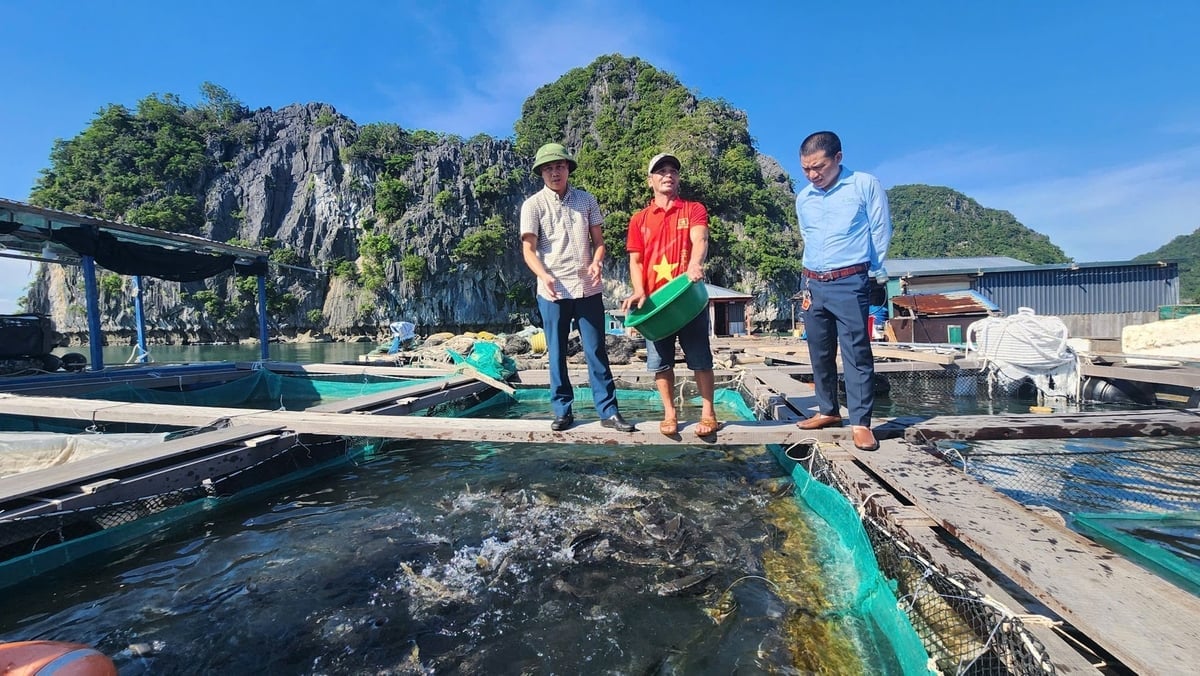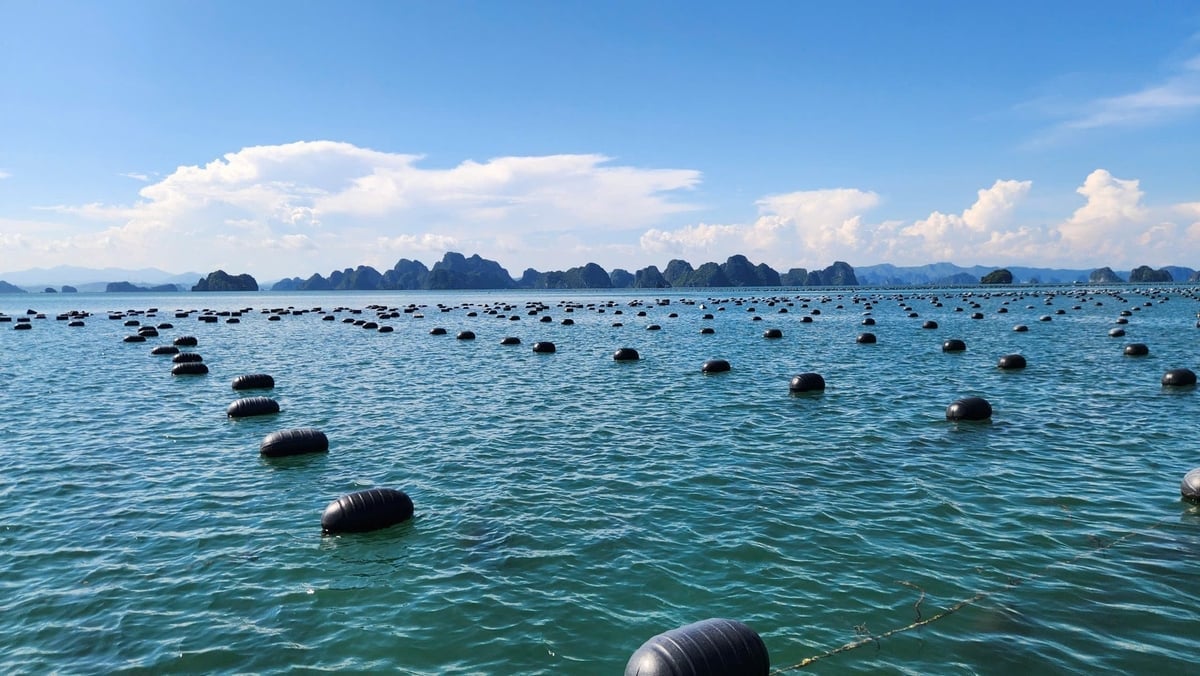October 14, 2025 | 10:45 GMT +7
October 14, 2025 | 10:45 GMT +7
Hotline: 0913.378.918
October 14, 2025 | 10:45 GMT +7
Hotline: 0913.378.918
Developing marine aquaculture is a major orientation of the Party and the State, aimed at making the maritime economy a driver of sustainable growth. To realize this goal, the role of national and local agricultural extension services is one of the key factors.
Through various programs and projects, the extension system not only transfers technology and provides technical training but also builds confidence for fishermen and enterprises to boldly invest toward industrialization.

Aquaculture model in the sea area of Van Don Special Zone (Quang Ninh province). Photo: Nguyen Thanh.
In Quang Ninh, a locality with rich potential for marine aquaculture, extension activities have proven highly effective by contributing to a shift in production mindset, improving productivity, and enhancing the value of aquaculture products.
The national extension service has concentrated resources on models applying advanced technologies in marine farming, from the design of wave-resistant HDPE cages to environmental and disease management processes.
For example, the model of farming golden pompano in HDPE cages implemented in Quang Ninh, after 10 months, achieved a yield of 19.1 kg/m³, with profits increasing by 13% compared to traditional methods, while reducing environmental pollution and disease risks. For blood cockles, a 25,600 m² farming model in Quang Ninh reached a yield of 37.5 tons/ha, generating profits of over 900 million VND, contributing to sustainable livelihoods for coastal communities.
Nguyen Van Cuong, Director of Cuong Hoa Cooperative, said the cooperative currently operates more than 150 hectares of marine aquaculture, focusing on species such as grouper, cobia, blood cockles, and Pacific oysters. Almost all cages and buoys have been converted to HDPE materials, which improve durability, withstand strong waves, and reduce risks compared to traditional methods.
“The application of new technology not only enhances productivity and quality but also expands opportunities for market linkages with enterprises, especially for export. We hope that with the continued support of extension services, the cooperative’s marine aquaculture will develop in a more sustainable and modern direction,” Mr. Cuong emphasized.
This success has been achieved thanks to the strategic guidance from the National Agricultural Extension Center and the proactive role of Quang Ninh’s extension services in organizing training, providing technical guidance, monitoring, and supporting farmers. As a result, fishermen are gradually changing their mindset and practices, shifting from small-scale farming to large-scale commercial production.

Quang Ninh has significant potential and advantages for developing modern aquaculture. The province is well-positioned to adopt advanced technologies such as offshore farming and high-tech cage systems. Photo: Nguyen Thanh.
Mr. Nguyen Ba Lam, Deputy Director of the Quang Ninh Agricultural Extension Center, shared: “In the coming period, we will focus on scaling up marine aquaculture models that apply high technology, particularly HDPE cages and offshore farming, in order to minimize natural disaster risks, protect the environment, and enhance product value. The Center will also prioritize training human resources, supporting fishermen in accessing scientific and technical advances, building brands, and connecting with markets. The ultimate goal of Quang Ninh’s extension services is to develop marine aquaculture into a large-scale, sustainable commercial industry that directly contributes to the growth of the maritime economy and improves the livelihoods of fishermen.”
Beyond economic efficiency, extension models also affirm sustainability. The use of industrial feed and disease-free fingerlings has reduced the exploitation of natural trash fish, thereby protecting marine biodiversity. These strengths not only help improve productivity and product quality but also contribute to sustainable fisheries, enhancing the competitiveness of local seafood in both domestic and international markets.
Quang Ninh’s extension services play a pivotal role as the direct bridge between local communities and science and technology. Training and capacity-building activities have equipped fishermen with a production mindset based on value chains, linking them with cooperatives and enterprises. As a result, the province’s marine aquaculture products gain greater competitiveness and move toward establishing strong brands in the marketplace.
From Quang Ninh’s experience, it can be affirmed that national and local extension services not only provide technical support but also play a guiding role in helping marine aquaculture integrate into broader markets. In the context of climate change, natural disasters, and intense competition, extension activities are becoming increasingly essential, contributing to the sustainable, modern, and effective development of marine aquaculture.
Translated by Kieu Chi

(VAN) In 2025, coffee, cashew nuts, rice, seafood, and fruits and vegetables will be products with the greatest breakthrough potential, thanks to international market demand and the country's orientation toward developing high-quality, sustainable products.

(VAN) Developing standardized growing areas is seen as the foundation for Vietnamese fruits to secure a lasting foothold in high-end markets and expand opportunities for sustainable exports.

(VAN) The experience gained from deploying digital technology, IoT, smart irrigation, and methods for measuring greenhouse gas emissions and soil nutrients is opening vast prospects for the nation's 1 million-hectare rice project.

(VAN) After years of struggling with mosaic disease, farmers in Tay Ninh have regained hope as disease-resistant cassava varieties have begun to prove their effectiveness in the fields.

(VAN) From the laboratory to the fields, the project 'Research and application of molecular markers in breeding cassava varieties resistant to mosaic disease' is opening a new direction for the cassava industry.

(VAN) Cassava mosaic disease is wreaking havoc on cassava crops, prompting scientists to develop resistant varieties using molecular marker technology - a breakthrough that could pave the way for the sustainable development of the industry.

(VAN) After detecting an H5N1 avian influenza outbreak, Khanh Hoa Department of Agriculture and Environment promptly implemented disease prevention measures.